FRIVOLITY?
Looking at Frivolity through the Lens of Documents Obtained through the Freedom of Information Act
The Washington Post article which broke the news of my EEOC charge the exact same minute that the President and CEO of the Baltimore Symphony sent the members of the orchestra an email telling them not to talk about it contains a few things which make me shake for reasons other than the gallon of cold brew coffee I just drank.
Before I go further, I will state that all excerpts here, from the McGuire Report, the external investigation commissioned by the Baltimore Symphony, to my EEOC charge, and to the sworn affidavits from both the student and other victim of sexual assault I provide at the end, have been completely obtained through the Freedom of Information Act. All redactions are my own.
These red circles are the first thing in the article I have issue with:
Frivolity. What is frivolity? Something carefree, something lacking value, or something lacking purpose.
Let me tell you: talking about these topics, going against the generational and institutional Codes of Silence, and with an international news source no less, is not something anyone does in a carefree manner. Not even a fully crazy person would do this in a carefree manner. Making your organization embark on a external sexual harassment investigation wherein your colleagues get interviewed about you is not something you do in a carefree manner. Knowing you have to sit onstage with these people and make music with them afterward simply does not allow you to undertake any of this with frivolity.
Knowing in advance that people who are likely your colleagues will leave comments such as this one below on that very article really puts a damper on your ability to be “utterly frivolous.” Of course you can never fully confirm the identities of these commenters because very few people have the personal decency to comment with their own names, but it still doesn’t feel good even thinking about the possibility a little bit onstage:
Here’s my response to “Pianist”: Of course, because you yourself have not seen your colleague and friend behave badly, that confirms that he is exemplary! And so, while you believe in #metoo, you don’t in this particular case. And of course, you have nothing to gain by continuing to support him. And I’ll sign my own name: Katherine Needleman
Is there no value or purpose to making a complaint such as this one? I believe there was. The first thing I accomplished was the establishment of a sexual harassment policy in my workplace. Despite previous reports of sexual harassment and assault (not just from me against Jonathan Carney; see affidavits below), the Baltimore Symphony did not have a sexual harassment policy for musicians until May, 2018, after they began their “external investigation” into my issues with Jonathan Carney. This is an excerpt from the McGuire report about the previous lack of a sexual harassment policy:
Next, there was no 2005 investigation as Ruther claims. I did not report Carney until December, 2006, so it would not have been possible. Nonetheless, Melissa McGuire, the investigator the BSO commissioned a report from in 2018, had the following to say about the first time the BSO looked into this, which is likely what Ruther erroneously refers to in the article:
McGuire goes further in recommendations at the end of her report:
Ruther’s claim that the orchestra “concluded there was no substance to the incident” is based on Carney’s lie. The orchestra never took responsibility for Carney’s lie in the very edited and biased summary of this report it provided to the press. So while I maintained his lie to every member of the press I spoke to, it never made the press. Because that was just an “allegation” of mine. My employer had the power to confirm my allegation and therefore give it wings—it was all over their own commissioned report—but avoided doing so very intentionally.
The following is an excerpt from my EEOC charge:
The BSO could not provide their own documentation of my report in December, 2006, because they destroyed the documents. The following is an excerpt from my EEOC charge:
The following is an excerpt from the McGuire Report itself:
The following is my account of what happened in December, 2006, from my EEOC charge:
My next issue from the Washington Post article, circled in red:
The McGuire report says the concertmaster is not my supervisor, or anyone else’s:
Here are salary listings from the BSO’s Forms 990 from fiscal years 2018, 2019, and 2020. I pulled these from their own website of “Key Employees” and “Highest Compensated Employees.” While I was unable to find myself listed in these documents, Carney was in all of them. Money talks. (Note that Carney is referred to by his first name, Edward, in the 2020 Form 990.)
The following sworn affidavit regarding other documented allegations of sexual assault (not by Jonathan Carney) at the Baltimore Symphony was submitted to my EEOC case:
Since this affidavit references a time prior to 2018, it is especially troubling that the BSO did not see fit to adopt a sexual harassment policy until during the McGuire investigation.
I leave you with another affidavit submitted to my EEOC case. This is from the student who went public just one day after I did about what she claims Jonathan Carney said about her. She writes that she felt the BSO “did not want to know what I had to say or what happened when I was a student with Jonathan Carney.”




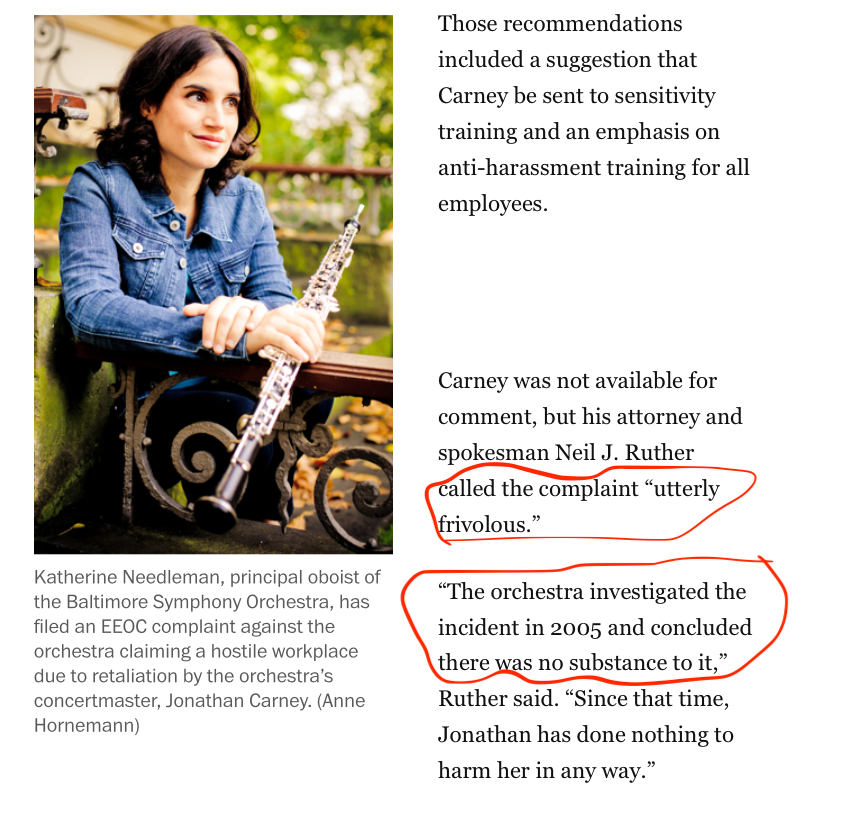
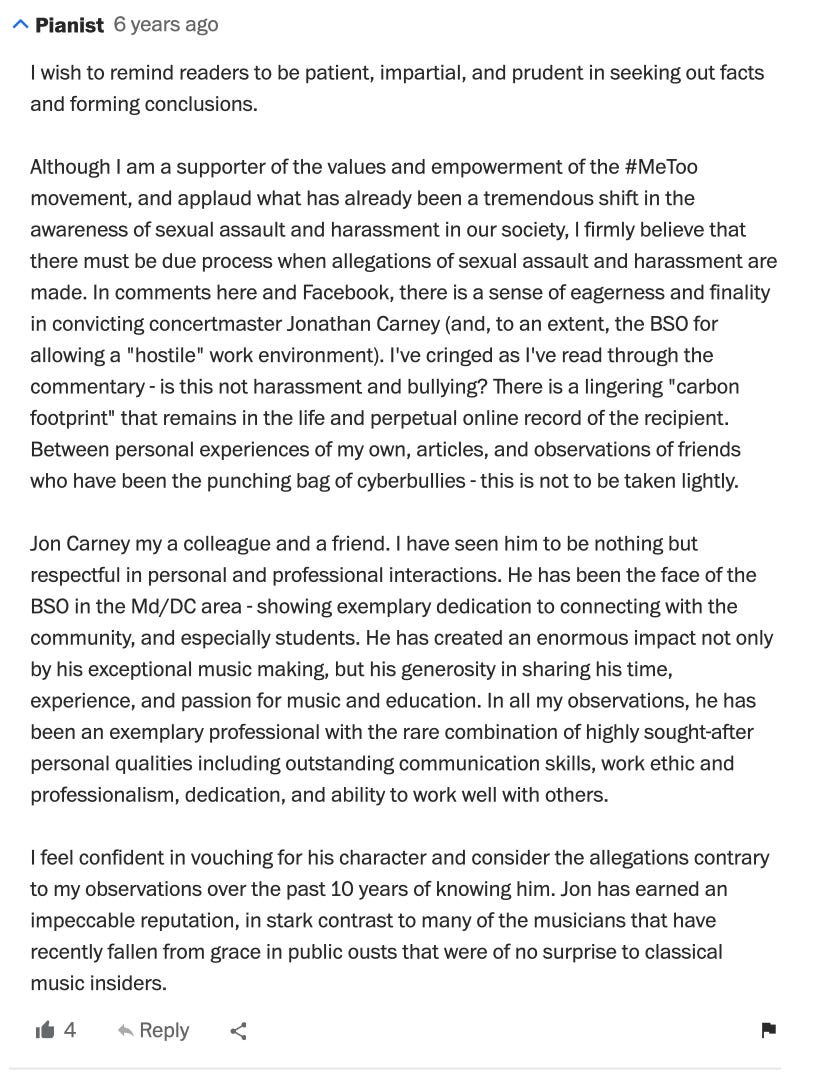


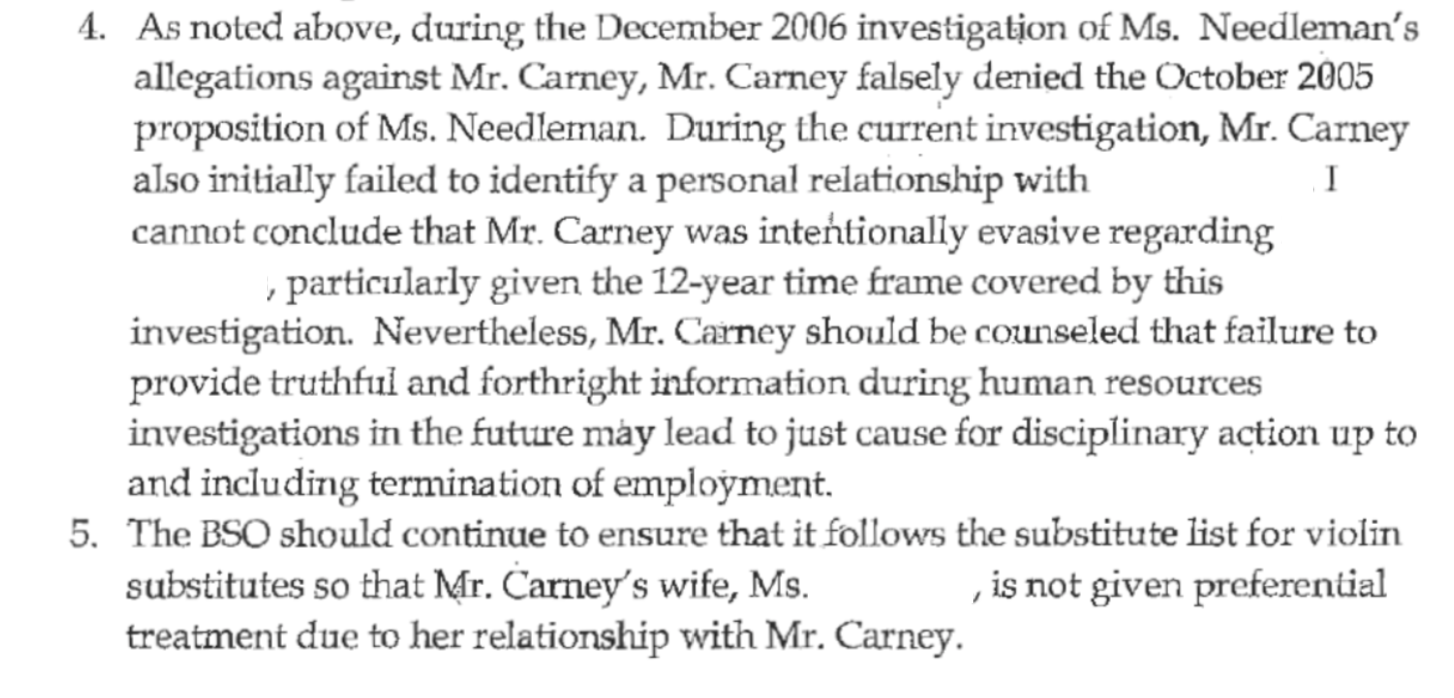



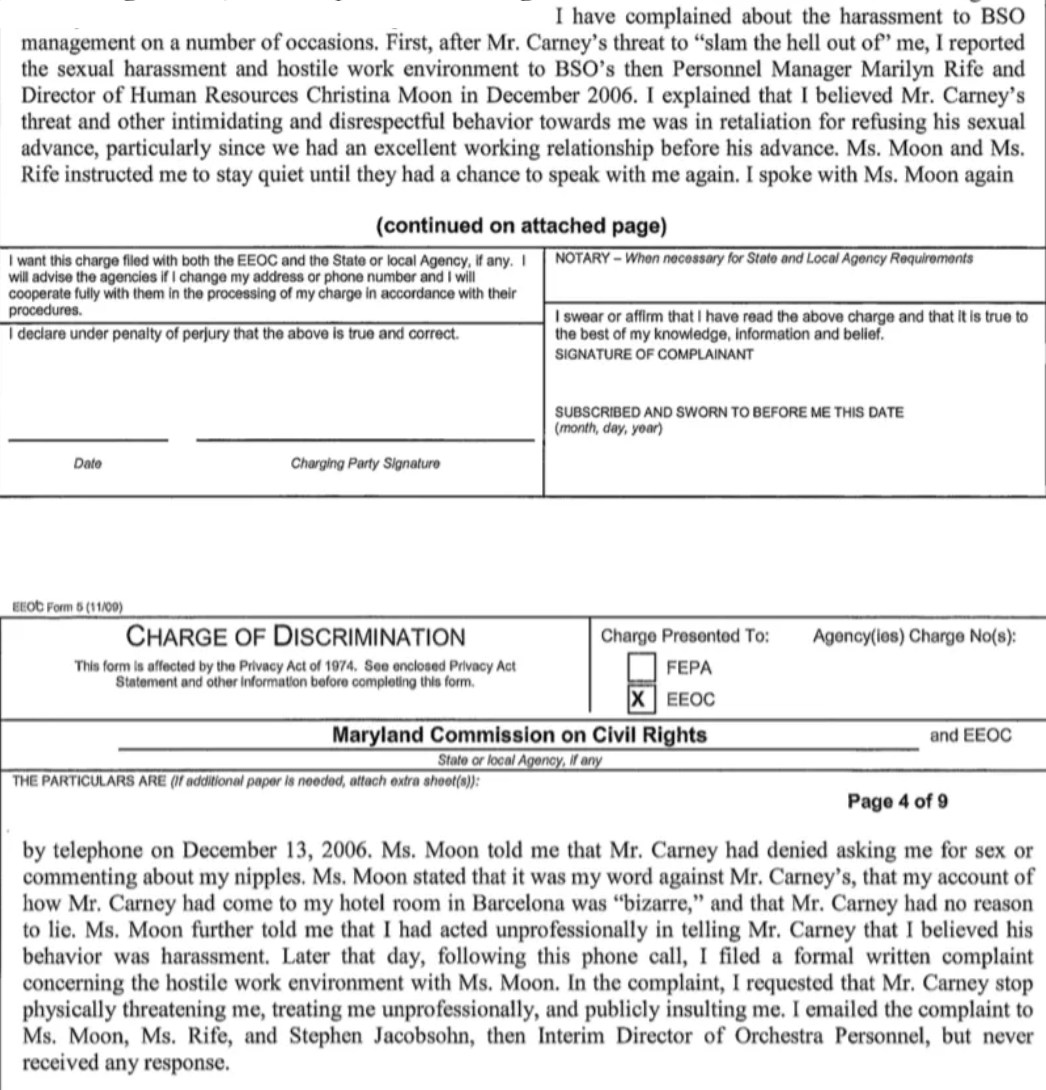




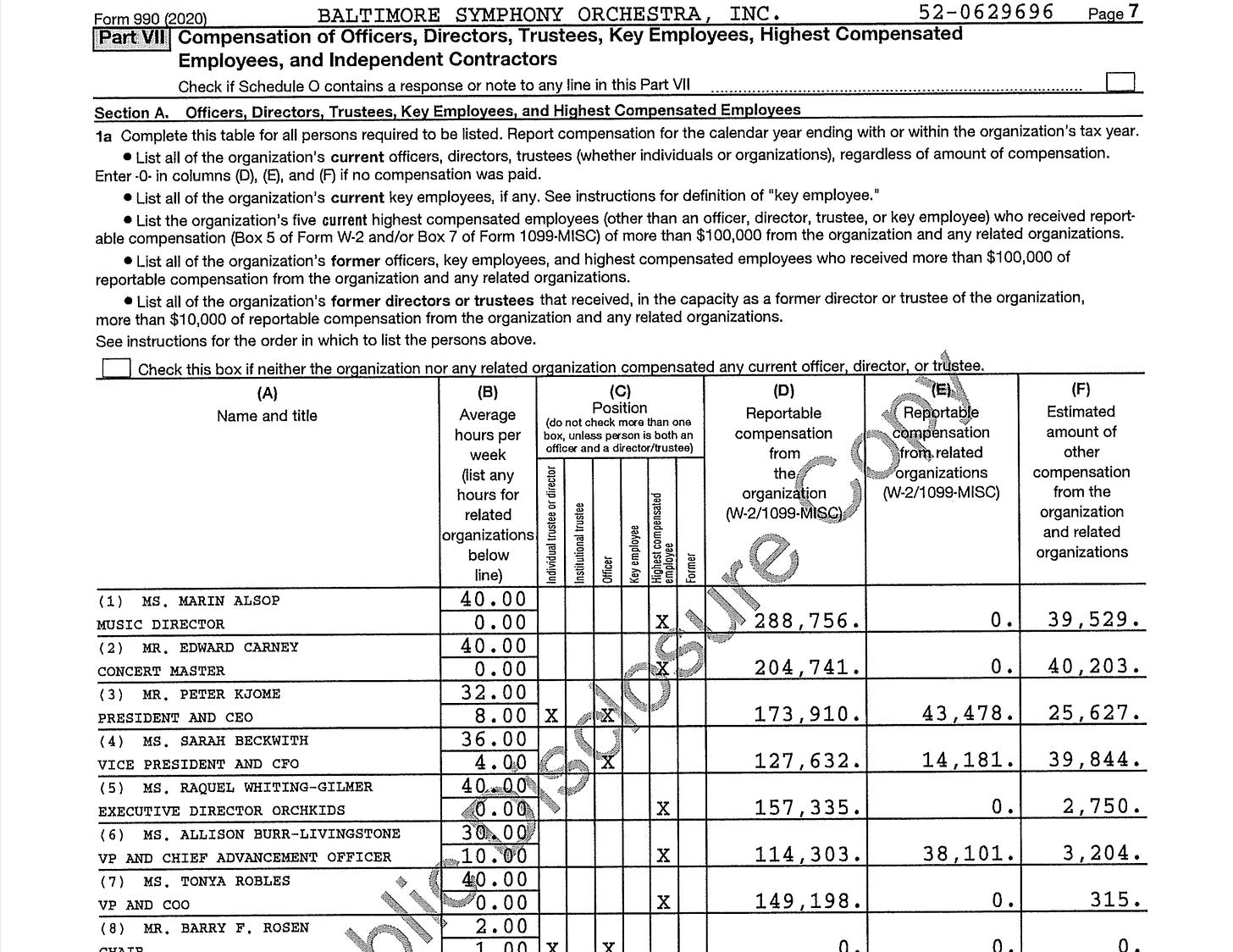
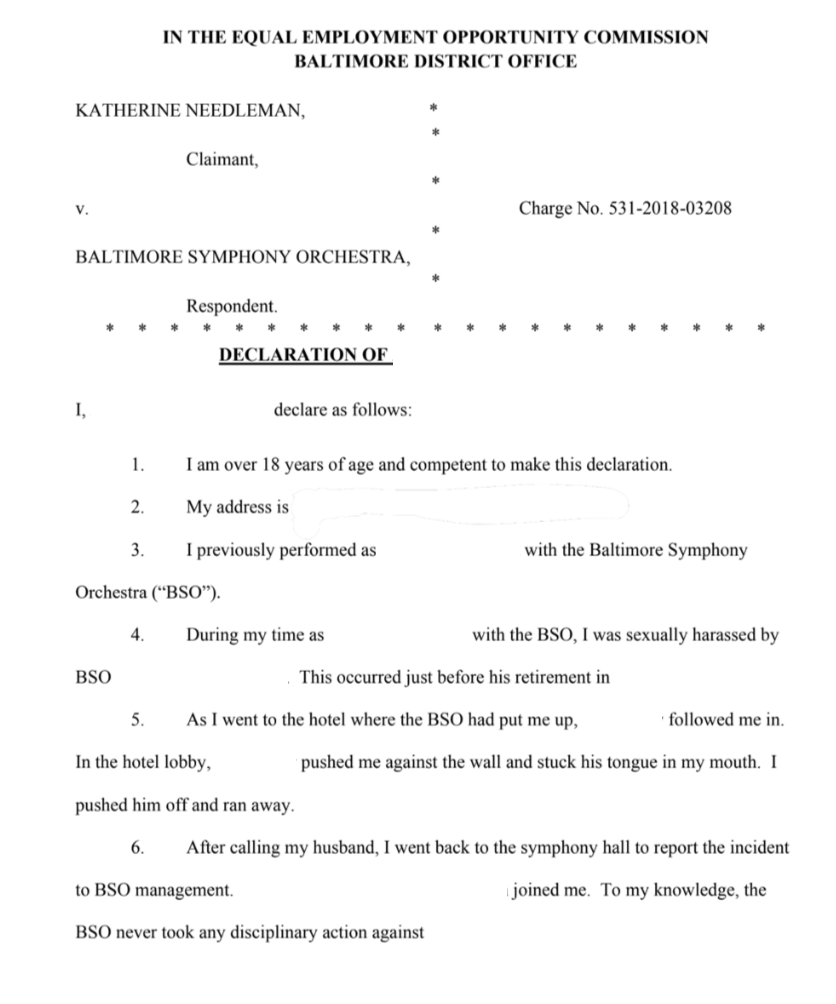
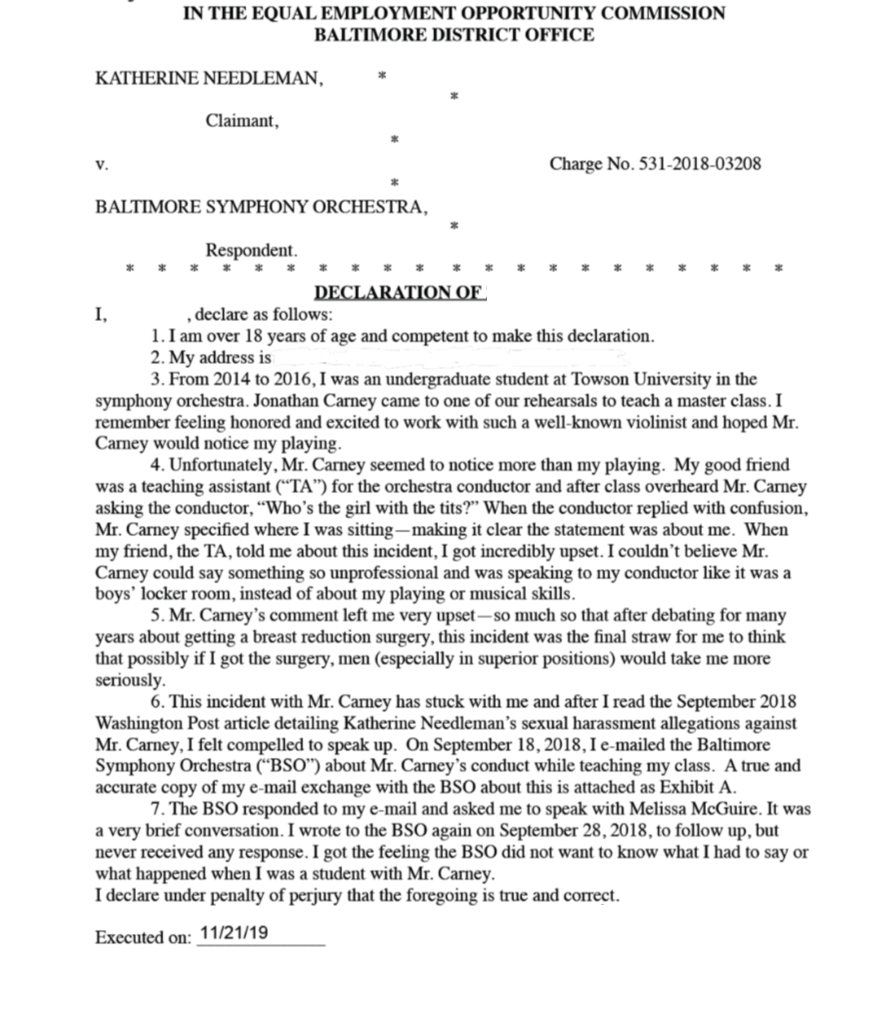
I think this is a prime example of weasel behavior. Mr. Carney, while in an acknowledged position of authority for the orchestra, is not documented as having the ability to determine your employment status, so he is not your “supervisor”, per se, and he is not held to the standard that a supervisor would be in regards to his disgusting behavior to a fellow musician in a subordinate position. The recommendation that the BSO warn him that future instances of lying during an internal investigation can warrant termination, while doing little else in these cases, suggests he didn’t violate a documented policy and thus couldn’t be terminated with-cause, perhaps due either to an existing contract or state law. Hopefully this has been fully rectified so that future instances of misconduct can have the appropriate repercussions. This type of behavior is just absolutely unacceptable and should not be tolerated in any workplace.